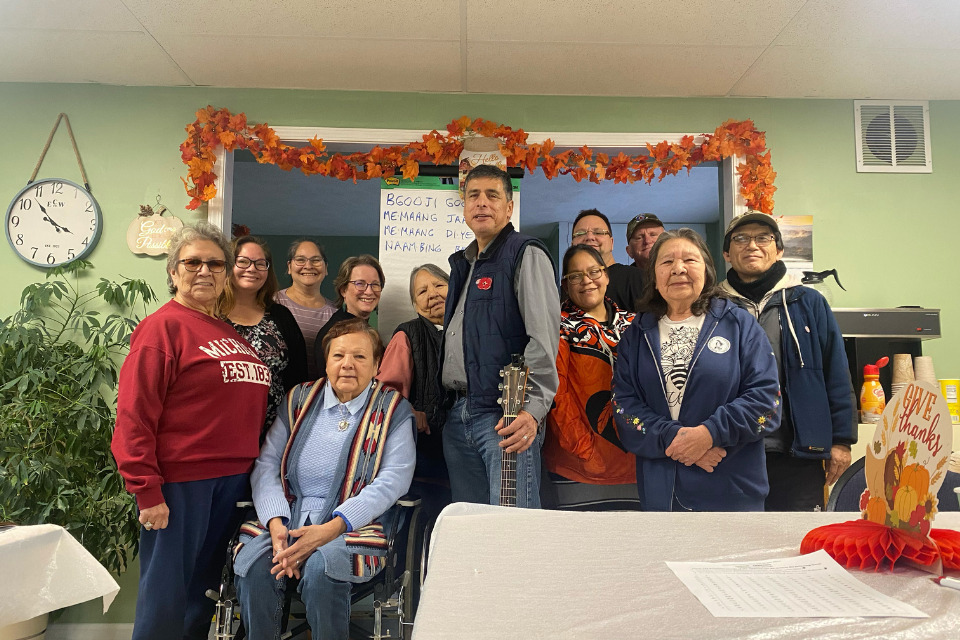STEP 3: Here are 8 suggestions for congregations, individuals, and families to celebrate and undergird our indigenous communities.
November is National Native American Heritage Month, and United Methodists are encouraged to set aside time to celebrate the rich cultures and living histories of Native Americans.
The Michigan Conference’s Committee on Native American Ministry (CONAM) supports the ministry of 8 Native congregations here in Michigan, plus the PaWaTing MaGedwin Kikaajik (Native American Elders Program) hosted by Northlawn UMC in Grand Rapids. This program is a Step 2 Ministry Partner of the Michigan Conference’s EngageMI mission engagement program.
CONAM works to honor and preserve the indigenous cultural and religious traditions of these congregations, celebrate their gifts and spirituality, and name the challenges they face. They also call United Methodists in Michigan to learn the history, hear Native stories, and discern how they can become advocates or allies for Native people here in Michigan.
The General Commission on Religion and Race of The United Methodist Church has put together 8 suggestions for congregations, individuals, and families wishing to celebrate and undergird our indigenous communities.
-
- Learn about Native people and their presence in your community. What tribal groups were original to your town? Which groups live in your area now? Click here to find out the names of Michigan’s federally recognized tribes. What concerns and contributions are Native leaders focused on? Ask to visit a reservation and listen to the people there.
- Gain a greater awareness of national concerns pertaining to Native people. Consider visiting nativenewsonline.net to read national Native news stories and learn more about what is happening outside your community.
- Delve into the authentic history and stories of Native people. Many stories by non-Natives are romanticized and fictionalized and are based on a poor stereotype of indigenous people (think: stories about Pocahontas in animated movies and U.S. pop culture). Read the faith stories of Michigan Native Americans, like Native Elder Valerie Maidens from Northport UMC. Seek out books and other resources reflecting Native perspectives.
- Pray for and support Native ministries, community groups, and businesses. Consider making a regular financial donation to one of our Native American ministries here in Michigan, such as the PaWaTing Native American Elders Program. Or you can give to the denomination-wide Native American Comprehensive Plan and the Native American International Caucus.
- Challenge appropriation and stereotypes. Fight cultural and institutional bias in language, word, and deed by knowing truth from fiction. Bishop David Wilson, the first Native American elected bishop of The United Methodist Church, compiled these 11 facts United Methodists should know about Native peoples in society and the church. Don’t wear traditional Native jewelry and clothing before learning whether they are intended for and appropriate for non-Native wearers. Check your use of pejorative sayings such as “Indian giver.”
- Discover what The United Methodist Church believes about Native people and their civil and human rights. The General Board of Church and Society created this resource with statements from The Book of Resolutions of The United Methodist Church.
- Contact your conference Committee on Native American Ministries (CONAM). Find out what members of this committee are working on in your conference and get involved. Tammy Okuly is the Chairperson of the Michigan Conference CONAM. Email her at [email protected] and ask how you can do more for our Native churches.
- Consider taking legislative action. Learn more about the proposed Truth and Healing Commission on Indian Boarding School Policies Act and how you can take next steps.
Additionally, here are books for children about Native Americans:
-
- We Are Still Here! Native American Truths Everyone Should Know by Traci Sorrell (Charlesbridge, 2021)
- We Are Water Protectors by Carole Lindstrom (2020, Roaring Book Press)
- Native History for Kids: With 21 Activities by Karen Bush Gibson (Chicago Review Press, 2010)
- The Very First Americans by Cara Ashrose (Grossett & Dunlap, 1993)
- First White Frost by Homer Noley (Abingdon Press, 1991)
- Massacre at Sand Creek by Gary Roberts (Abingdon Press, 2016)
- Kill the Indian, Save the Man by Ward Churchill (City Lights Publishers, 2004)
- An Indigenous People’s History of the United States by Roxanne Dunbar-Ortiz (Beacon Press, 2015)
- Fry Bread: A Native American Family Story, a children’s book by Kevin Noble Maillard and Juana Martinez-Neal (Roaring Book Press, 2019)
Editor’s note: This article was adapted from a resource created by the General Commission on Religion and Race of The United Methodist Church.

